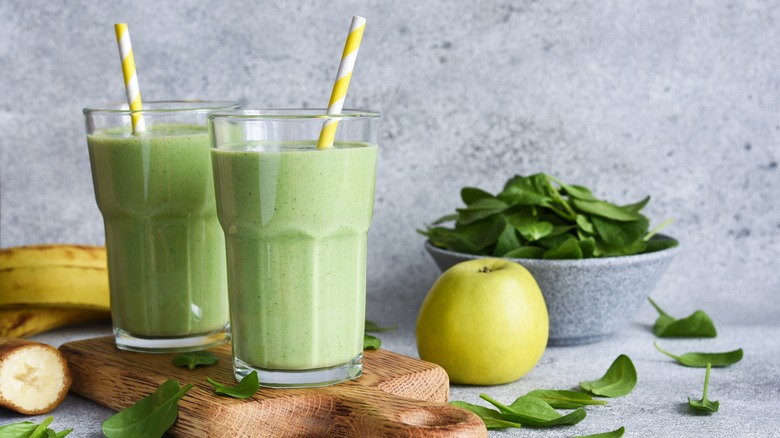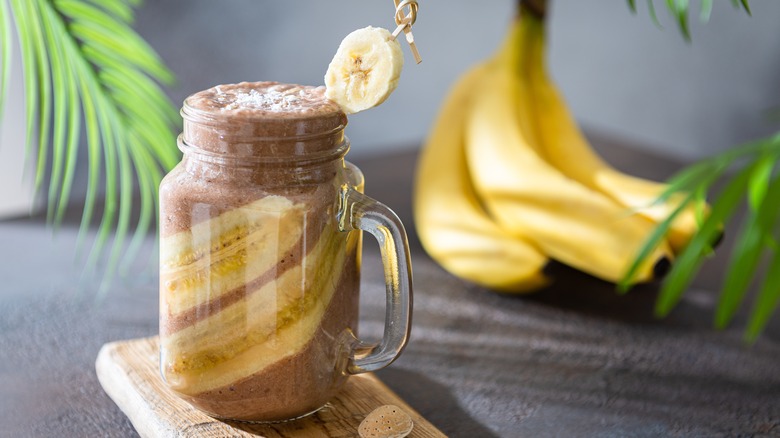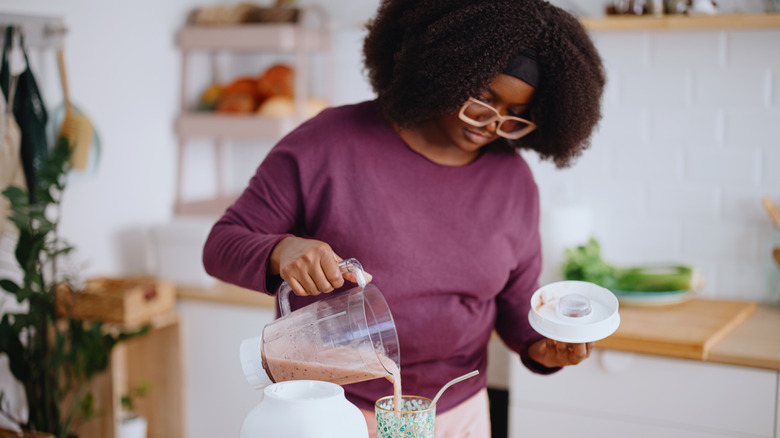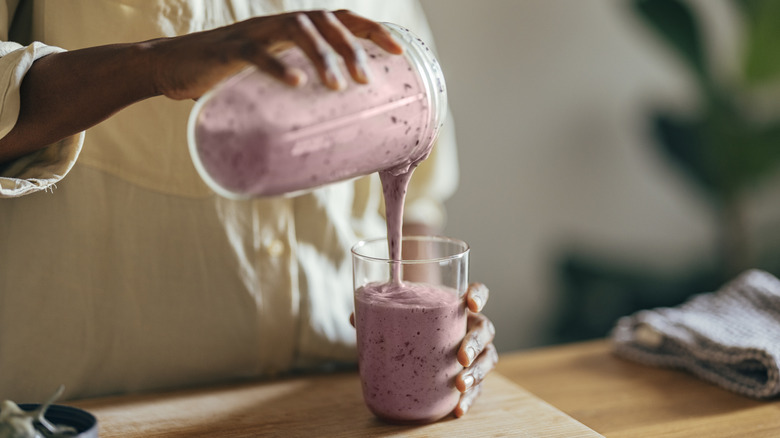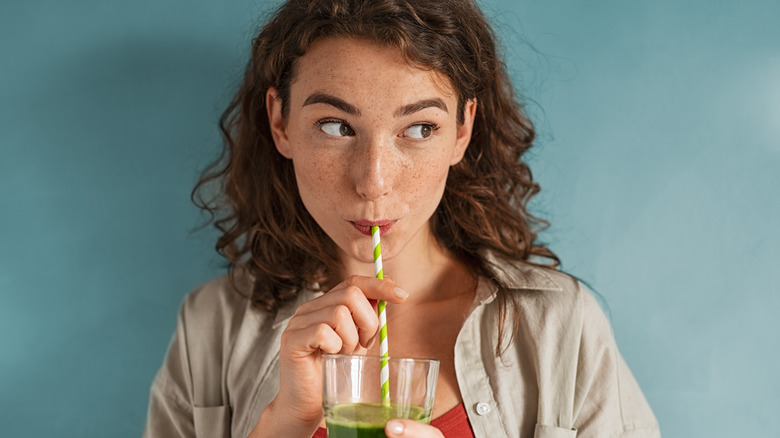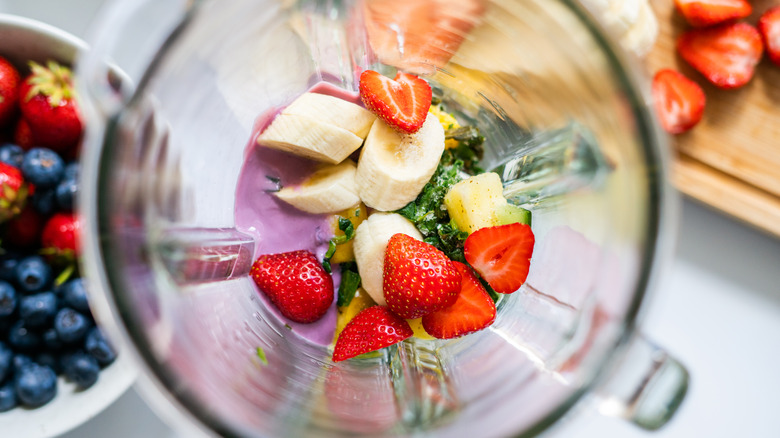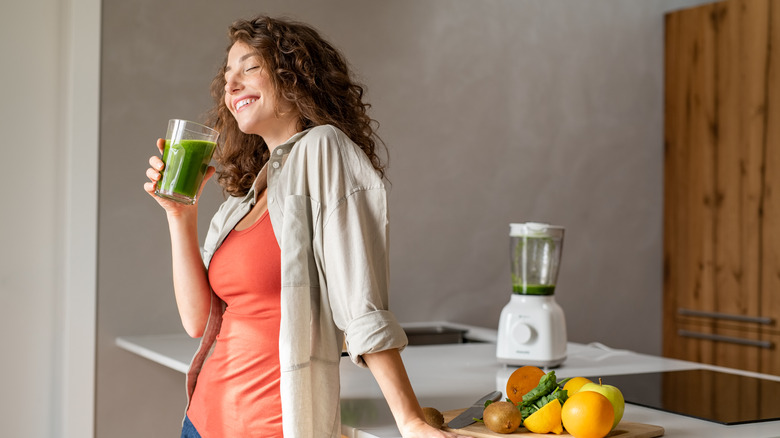Everything That's Not Healthy About Smoothies
Smoothies are a multibillion-dollar industry. Part of this is due to the fact that Americans are more concerned with their health and seeking ways to fit more nutrients into their diet. Another part of their popularity is convenience — you can get an entire meal's worth of nutrients in a cup on the go (via imarc). Smoothies are also delicious and versatile, offering countless ways to customize and come up with new flavor sensations.
However, the smoothie story isn't all good, and there are a lot of potential pitfalls that can make smoothies counterproductive to health. For example, store-bought smoothies often have added sugar, which is harmful to your health. Depending on how you drink them — and how much you drink — smoothies can contribute to excess calories in your diet and weight gain. They can even cause tooth damage due to their acidity.
Some people go overboard, skipping whole meals and drinking smoothies instead. Down the road, this could lead to missing out on key nutrients and developing nutrient deficiencies. Don't get us wrong — smoothies can be a concentrated source of nutrition and better than some other options you might reach for in a hurry. However, to keep them healthful, it's important to understand what can go wrong and how you can keep your smoothies in check.
They're liquid calories
Smoothies come in handy when you're running out the door in the morning. Just grab a straw and sip while you drive. However, if you're watching your weight, convenience might not be the best way to go. Research has shown that solid foods provide more satiety than liquids. That means you're more likely to still feel hungry after your smoothie than if you ate the whole foods. One of the reasons for this is that a smoothie takes less time to consume than a solid meal. According to Proceedings of the Nutrition Society, longer oro-sensory exposure times are associated with lower overall energy, or calorie, intake at a meal. The body doesn't appear to register liquids in the same way as solids and therefore doesn't communicate satiety to the brain. Because chewing your food takes longer than drinking your food, your body has more time to register that it's full.
When a meal isn't satiating, you may consume more calories than you planned. You're also likely to feel hungry again sooner than you would if you had eaten a meal in solid form. That can cause you to reach for a snack, adding additional calories to your daily intake that can put you over your calorie budget for the day. When this happens on a regular basis, you may gain weight.
They're often high in sugar and calories
Store-bought smoothies are made to be appealing to the average consumer's taste buds, and that often means they contain added sugar. One smoothie from the nationwide chain Smoothie King contains 50 grams of added sugar. Sugar has 4 calories per gram, which means that's 200 calories just from sugar. Smoothies are supposed to be good for you, but there's nothing healthy about added sugar. It provides zero nutrients, and excess intake of added sugar has been linked to heart disease, obesity, type 2 diabetes, colon and pancreatic cancers, dementia and Alzheimer's disease, liver disease, and more.
That's why the American Heart Association recommends that adults should limit their intake of added sugars to 6% of daily calories. For men, that's about 36 grams of added sugar; and, for women, it's 25 grams. Just one of those smoothies would supply double the limit for women — and that's in addition to any other added sugars consumed during the day.
If you're buying a pre-made smoothie, be sure to check the nutritional information. If you purchase a bottled smoothie you'll find that info on the back; if you're buying it at a smoothie shop, you'll have to ask for the information or look for it online. If you're making smoothies at home, avoid adding sugar or fruit juice. Use whole fruits to provide natural sweetness as well as nutrients. Smoothies should taste lightly sweet — they shouldn't taste like dessert.
It's easy to consume more than one serving
How often do you throw your smoothie ingredients in the blender without measuring and end up with much more than you planned? Of course, smoothies don't really keep, so you grab a bigger glass and drink it all down. Do you know how many calories you're getting in that giant smoothie? Maybe more than you bargained for.
Store-bought smoothies can be even worse. For example, the smallest size smoothie at Smoothie King is 20 ounces. One menu choice contains 400 calories in the small size, 660 calories in the 32-ounce medium serving, and 810 calories in the 40-ounce large serving. For most people, this is going to be way more calories than they need, especially if it's being consumed as a snack. The average person needs about 2,000 calories a day — one medium smoothie would supply about a third of their daily calories.
A reasonable size for a smoothie is about 8 ounces, depending on the ingredients you're using in your smoothie and whether your smoothie is being eaten as a snack or a whole meal. Avoid store-bought smoothies and make your own at home. Use fruits to sweeten it instead of sugar or fruit juice. Keep in mind that fruits higher in sugar, such as banana and pineapple, will raise the calorie count, as will high-fat additions like peanut butter. And consider investing in a single-serve blender, which will help you further control how much you're consuming.
They're often consumed on top of daily calories
People grab a smoothie like they grab a coffee — not in place of a meal but on top of a meal. And, like with a coffee drink, they often don't include those smoothie calories in their daily calorie accounting. This means that they could be taking in several hundred extra calories per day.
Exceeding your calorie needs on a regular basis is what leads to weight gain. When you consume calories that your body doesn't immediately need for energy, it stores them as fat. Over time, if you continue to add to those stores with unnecessary calories, you gain weight. Balancing your calories in and calories out is an important part of staying at a healthy weight.
Do you know how many calories you need in a day to manage your weight? Many people don't. Calorie needs are based on age, gender, and activity level — younger people need more calories than older people, males need more calories than females, and active people need more calories than sedentary people. But an estimate is that the average person needs about 2,000 calories a day. A 400-calorie smoothie is 20% of those calories, which leaves 1,600 calories to be divided between three meals and any other snacks. If that smoothie was just a snack, it's going to be hard to stay within your calorie budget for the day. If you're going to drink smoothies, it's important to keep track of them and include them in your daily calorie count.
Sipping smoothies could damage your teeth
You probably already know that sugar is bad for your teeth. It interacts with bacteria in the mouth and increases acidity, which leads to enamel erosion and tooth decay. If your smoothie contains sugar, it's not doing your oral health any favors.
But it's not just sugar that's the problem. Fruit and fruit juices are acidic and can also contribute to enamel erosion. One study looked at the effects of smoothies on the teeth and found that they caused significant tooth erosion. They were even more damaging than a diet soda.
That doesn't mean you shouldn't eat fruit or drink a smoothie, but you should take some precautions. Keep it free of added sugar and don't add fruit juice, which can be a concentrated source of acids. Balance the fruit in your smoothie with other lower-acid or non-acidic ingredients like spinach and kale, dairy, and healthy fats from nuts and seeds. Drink your smoothie through a straw, which reduces direct contact between the liquid and your teeth. Also avoid sipping your smoothie over a long period of time, which can increase the amount of time your teeth are exposed to acid. When you've finished your smoothie, brush your teeth or rinse your mouth out with water.
They can't substitute for a complete diet
Smoothies are so delicious that you could probably eat them at every meal — and some diet plans even recommend doing this. However, it's not a good idea as a long-term nutritional plan. A well-balanced diet includes the proper mix of carbohydrates, protein, and fats. This provides an array of vitamins, minerals, and antioxidants you need for good health. Most smoothies are missing key components. They tend to be high in fruit, but low in protein or healthy fats. Protein is key for muscle maintenance and repair and for regulating hormones. Healthy fats reduce heart disease risk and aid blood sugar control.
More often than not, the big smoothie mistake is taking in too many calories. However, some smoothie diet plans recommend consuming very low-calorie smoothies. This may mean that you aren't getting the calories your body needs for energy every day, which can result in fatigue and weakness.
If you choose to consume smoothies for some or all of your meals — whether to lose weight or improve your health — it's best to only do so for a short period of time. Ensure that your smoothies are well-balanced and contain the right combination of carbs, protein, and fat.
How to keep your smoothie healthy
There's no reason you can't enjoy smoothies if you prevent some of the potential pitfalls above. Avoiding sugar bombs is the biggest concern, and that can easily be done by reading labels and asking about ingredients when you're purchasing a smoothie at a cafe or market. At home, skip the sweetener and enjoy the light sweetness of fresh fruit. Refrain from adding fruit juice, which is a concentrated source of sugars without the fiber that whole fruit provides. Use cow's milk or plant-based milk instead. Add leafy greens to your smoothie, as well as other vegetables, for a wider array of nutrients. Ingredients like yogurt, nuts, and seeds can be a good source of protein and healthy fats.
Keep your serving size reasonable by avoiding smoothie chains offering giant-sized drinks. Make your own at home using a single-serve blender and carefully measure out your ingredients. Ensure your smoothie fits into your diet, providing the correct amount of calories so you don't exceed your daily calorie budget. If you are going to follow a smoothie diet, make sure the smoothie recipes are well-balanced and that you only follow the diet for a short period of time.


